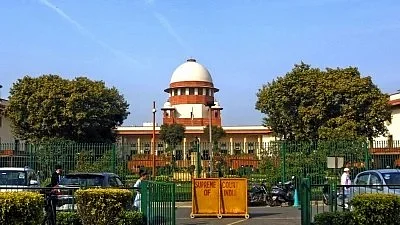Custody row: Supreme Court says won’t pass orders hurting India-Russia ties
The case centres on a Russian woman who allegedly fled India with her child amid a bitter legal dispute with her estranged Indian husband

The Supreme Court on Friday, 31 October, struck a delicate note of diplomacy and concern, observing that it was wary of passing any order that might strain India’s longstanding friendship with Russia — even as it grappled with the emotional complexity of a cross-border custody battle.
The case centres on a Russian woman who allegedly fled India with her child amid a bitter legal dispute with her estranged Indian husband. Expressing deep unease over the situation, a bench of justices Surya Kant and Joymalya Bagchi said the court’s foremost hope was for the child’s safety and well-being, even as it acknowledged the “diplomatic challenge” now facing the Ministry of External Affairs (MEA), the Indian Embassy in Moscow, and the Russian Embassy in New Delhi.
According to a report from the MEA, India has already reached out to Moscow’s office of the prosecutor general under the Mutual Legal Assistance Treaty (MLAT), seeking cooperation “on the basis of mutuality and comity.” Fresh requests were sent on 17 October through diplomatic channels, as efforts intensified to trace the woman and the child.
Appearing for the Centre, additional solicitor general Aishwarya Bhati told the court that the MEA was working closely with Delhi Police and also coordinating with Nepalese authorities, since the woman is believed to have crossed into Nepal before leaving for Sharjah and eventually Russia.
The court noted “disturbing indications” of the involvement of Russian embassy officials in facilitating the woman’s departure. Delhi Police, which issued notices seeking more information, has so far received no substantial response. A notice was also sent to the Sberbank of Russia in New Delhi, requesting details of the credit card used to purchase the flight tickets — but the bank declined to share information, citing secrecy laws.
“We do not wish to pass any order that might hurt the relationship between India and Russia,” the bench said, its words balancing diplomacy with compassion. “But it is also a matter where a child is involved. We only hope the child is safe and healthy. Let this not turn into a case of human trafficking.”
ASG Bhati told the bench she had personally engaged with Russian embassy officials, but “no substantial progress” had been made so far.
The top court has directed the MEA and Delhi Police to pursue every possible course of action discussed during the hearing, and to submit a fresh status report within two weeks.
The case dates back several months, when the Russian woman — who had been living in India since 2019 on an X-1 visa repeatedly extended by court order — allegedly defied a custody arrangement granting her partial guardianship of the child.
In July, the court expressed outrage after learning that she had fled the country via Nepal, calling the act “unacceptable” and a “gross contempt of court”. The child’s father, who continues to seek custody, maintains that the mother’s whereabouts — and the child’s — remain unknown.
Now, as the legal and diplomatic threads intertwine, the Supreme Court’s measured tone reflects both its compassion for a missing child and its caution to protect a vital international relationship — a human tragedy unfolding at the intersection of love, law, and diplomacy.
With PTI inputs
Follow us on: Facebook, Twitter, Google News, Instagram
Join our official telegram channel (@nationalherald) and stay updated with the latest headlines
